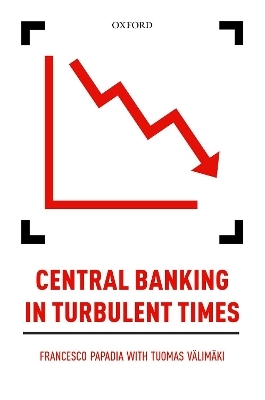
Central Banking in Turbulent Times
Oxford University Press (Verlag)
978-0-19-880619-6 (ISBN)
Central banks came out of the Great Recession with increased power and responsibilities. Indeed, central banks are often now seen as 'the only game in town', and a place to put innumerable problems vastly exceeding their traditional remit. These new powers do not fit well, however, with the independence of central banks, remote from the democratic control of government.
Central Banking in Turbulent Times examines fundamental questions about the central banking system, asking whether the model of an independent central bank devoted to price stability is the final resting point of a complex development that started centuries ago. It dissects the hypothesis that the Great Recession has prompted a reassessment of that model; a renewed emphasis on financial stability has emerged, possibly vying for first rank in the hierarchy of objectives of central banks. This raises the risk of dilemmas, since the Great Recession brought into question implicit assumptions that the pursuit of price stability would also lead to financial stability. In addition, the border between monetary and fiscal policy was blurred both in the US and in Europe. Central Banking in Turbulent Times asks whether the model prevailing before the Great Recession has been irrevocably altered. Are we entering, as Charles Goodhart has hypothesized, into the 'fourth epoch' of central banking? Are changes to central banks part of a move away from the global liberal order that seemed to have prevailed at the turn of the century? Central Banking in Turbulent Times seeks to answer these questions as it examines how changes can allow for the maintenance of price stability, while adapting to the long-term consequences of the Great Recession.
Francesco Papadia has nearly 40 years of central banking experience. Beginning with the founding of the European Central Bank (ECB) in 1998, he served as the Director General for Market Operations until 2012. Prior to that, he held various positions at the Banca d'Italia and was Economic Advisor at the EU Commission. Currently he is Chairman of the Board of the Prime Collateralised Securities, Chair of the Selection Panel of the Hellenic Financial Stability Fund, Senior Resident Fellow at the Bruegel Institute, and a university lecturer. Tuomas Välimäki is the Head of Monetary Policy and Research at the Bank of Finland. As the Bank's Chief Economist, he is a member of the European Central Bank's Monetary Policy Committee. During his two decades as a central banker, he has also worked as a visiting expert at the European Central Bank.
Introduction
1. Central banking before the Great Recession
1.1: Changing nature and objectives of central banks
1.2: Dominant central bank model before the crisis
1.3: The unsettled issue of financial stability
1.4: Planting the seeds of the Great Recession: macroeconomic, regulatory, supervisory, and intellectual aspects
2. Central banking during the Great Recession
2.1: Monetary Policy
2.2: Financial Stability
3. Central banking after the Great Recession
3.1: Hits to the pre-crisis central bank model
3.2: Was the pre Great Recession central banking model jeopardized?
3.3: Strategic and operational issues
3.4: Central banks in a new regulatory and supervisory landscape
3.5: How wide will the scope of responsibilities of central banks be?
3.6: Possible adaptations to the central banks model
| Erscheinungsdatum | 27.03.2018 |
|---|---|
| Verlagsort | Oxford |
| Sprache | englisch |
| Maße | 163 x 237 mm |
| Gewicht | 688 g |
| Themenwelt | Sozialwissenschaften ► Politik / Verwaltung ► Staat / Verwaltung |
| Wirtschaft ► Betriebswirtschaft / Management ► Finanzierung | |
| Betriebswirtschaft / Management ► Spezielle Betriebswirtschaftslehre ► Bankbetriebslehre | |
| Wirtschaft ► Volkswirtschaftslehre ► Finanzwissenschaft | |
| Wirtschaft ► Volkswirtschaftslehre ► Makroökonomie | |
| ISBN-10 | 0-19-880619-1 / 0198806191 |
| ISBN-13 | 978-0-19-880619-6 / 9780198806196 |
| Zustand | Neuware |
| Informationen gemäß Produktsicherheitsverordnung (GPSR) | |
| Haben Sie eine Frage zum Produkt? |
aus dem Bereich


